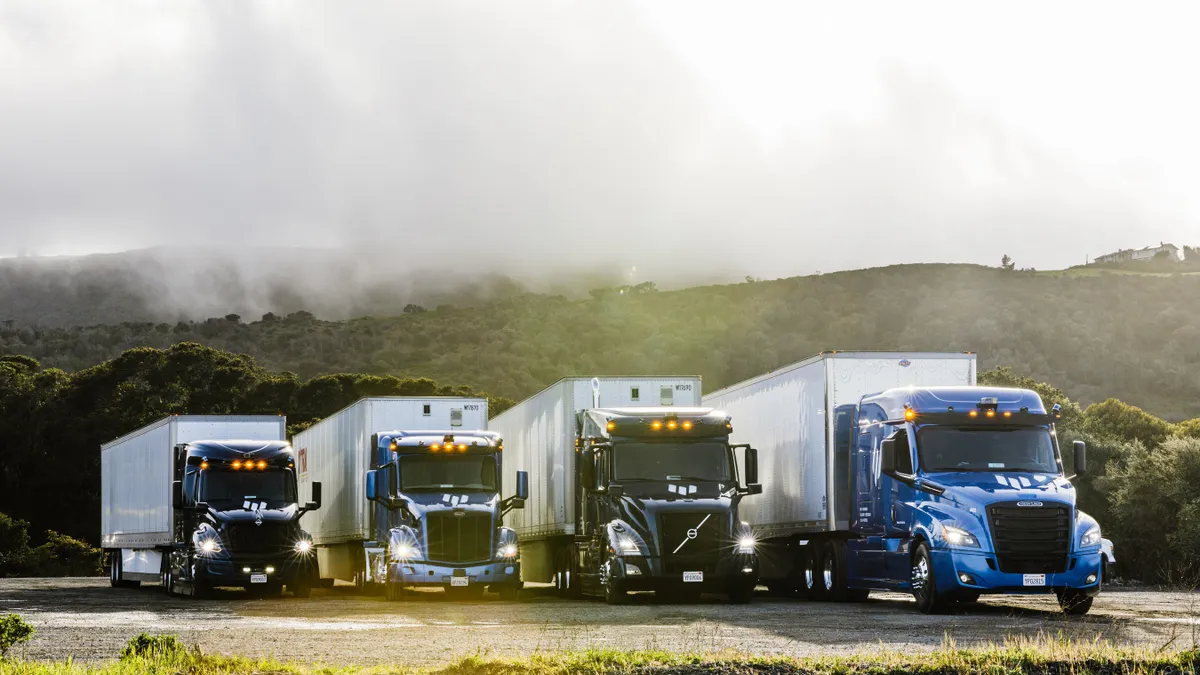Dive Brief:
- Knight-Swift and Embark Trucks are jointly launching the Truck Transfer Program, the companies said Tuesday, giving Knight-Swift drivers access to Embark's technology. For Knight-Swift, which announced its reservation of an Embark truck last fall, it will be the first time the company both owns and run an Embark truck.
- The Truck Transfer Program "is an industry-first testing configuration that aims to unlock the next level of development necessary for commercialization," the companies said.
- Embark and Knight-Swift said they will collect detailed feedback on the technology's performance. The companies also will use the research to define how the system will improve driver jobs, and they will develop procedures and tools that enable Knight-Swift to control Embark-equipped trucks through the whole process, from dispatch to parking.
Dive Insight:
As the largest U.S. TL carrier, Knight-Swift's investments in autonomous vehicles shows that interest in the technology continues to grow.
One reason is that turnover continues to dog long-haul trucking. The American Trucking Associations pegged turnover at an annualized 95% in Q3 2021, at large fleets, defined as fleets making more than $30 million in annual revenue.
To examine how it can use technology to retain drivers, Knight-Swift will look to Embark's abilities to address the growing demands of the national supply chain, which have pushed truck drivers and fleets to the top limits of capacity.
Options that Knight-Swift will look at include "when to have drivers haul loads alongside autonomous capacity, when to have drivers team-drive with the Embark Driver, or under what circumstances to have drivers move local hauls to fulfill the last mile," according to the press release.
Autonomous trucks, exempt from HOS rules, would go a long way in solving the problem of driver turnover and burnout, even if they required piloting by a fleet driver who would take the wheel in certain situations, such as denser or congested urban lanes.
Lane selection will also be an important part of AV adoption. Knight-Swift CEO Dave Jackson said in an October press release that Embark helped Knight-Swift "to accurately prioritize the network segments where this technology could deliver the most value and place reservations against this plan."
In other words, the company is carefully eyeing what lanes would best be served by autonomous trucks. The best lanes for AVs to target at this point are ones with high volumes and high repetition. Those are the kinds of lanes TuSimple sees as fitting with its technology, and other AV executives feel similarly.
Autonomous trucks won't try to solve complex driving scenarios first, such as how to drive through a snowstorm, CEO and co-founder of Locomation Çetin Meriçli said during ACT Expo last June. Instead, testing and deployment by fleets will target busy and worthwhile lanes in snow-free areas.
Thus, Texas and Arizona are often targets of deployment. TuSimple announced it would begin operating with UPS Supply Chain Solutions in North Carolina and Florida.
One particularly well-suited lane is likely between Houston and Dallas, Charlie Jatt, Waymo's head of commercialization for trucking, told ACT Expo. Jatt said such a lane for Level 4 trucks would be predictable hauls along known routes, populated with repeat customers at both ends.
"The beautiful thing about trucking is that there are 10,000 trucks a day going between Dallas and Houston," said Jatt. "Just on single lane, there is a tremendous business opportunity."












